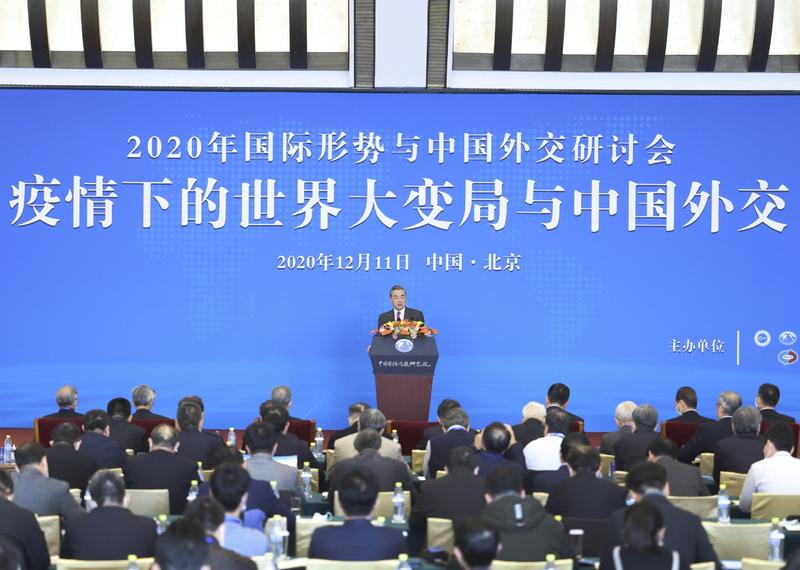 State Councilor and Foreign Minister Wang Yi delivers a keynote speech at an annual seminar in Beijing on the international situation and Chinese diplomacy in Beijing on Dec 11, 2020. (PHOTO / XINHUA)
State Councilor and Foreign Minister Wang Yi delivers a keynote speech at an annual seminar in Beijing on the international situation and Chinese diplomacy in Beijing on Dec 11, 2020. (PHOTO / XINHUA)
The United States has become "the most disruptive factor" in the international system, and it is high time the retrogression created by US anti-China forces comes to an end, State Councilor and Foreign Minister Wang Yi said.
Wang made the remark when delivering a keynote speech that included a retrospective of China's diplomacy this year and its New Year's resolutions at an annual seminar in Beijing on the international situation and Chinese diplomacy.
Wang also expressed hope that the two largest economies "will surely be able to find a path of peaceful coexistence" as long as they seek objectivity, reason, mutual understanding and convergence of interests.
The China-US relationship is in its "most challenging situation" in the past four decades, and the US has gone farther along the path of unilateralism while the world needs unity and cooperation more than ever, Wang said.
Wang also expressed hope that the two largest economies "will surely be able to find a path of peaceful coexistence" as long as they seek objectivity, reason, mutual understanding and convergence of interests
ALSO READ: Wang Yi: China-US divergences not about power contest
He criticized the US anti-China forces for slandering and demonizing China in every possible way and for stoking ideological confrontation in an attempt to stoke a new Cold War.
If such people persist in this retrogressive way, they will damage or even ruin US credibility, jeopardize world peace and stability and eventually be rejected by the world and by history, Wang said.
The China-US relationship has a complexity that goes far beyond the bilateral scope, he said. The situation involves choices such as multilateralism or unilateralism, progression or retrogression, justice or hegemony, Wang said.
When envisioning China's plan next year for building of a new type of international relations, Wang said it is necessary for China and the US to rebuild a strategic framework for the sound and stable growth of bilateral ties.
The two nations should meet halfway and make concerted efforts in this regard, and they need to restart dialogues, reopen cooperation and rebuild mutual trust, Wang said.
"China stands ready to open up dialogues on an equal footing with the US at all levels and in all areas to promote sincere, in-depth and constructive exchanges," Wang said.
It is high time for the two sides to coordinate and cooperate on COVID-19 responses to defeat the virus, and they should step up communication on major issues including the global economy, climate change, counterterrorism and cyberspace, Wang said.
On developing China's ties with Russia, Wang called on strengthening bilateral strategic coordination and forging a China-Russia pillar that supports world peace, security and global strategic stability.
For enhancing strategic mutual trust between China and the European Union, Wang proposed nourishing more consensus on the promotion of multilateralism, free trade and tackling climate change.
READ MORE: Wang Yi: China, US to work together to rebuild mutual trust
Wang said that to accelerate the recovery of a world economy impacted by pandemic, China will boost opening up to the outside world, oppose and boycott protectionism of any form, work for a stable and smooth global supply and industrial chain, and speed up the building of Silk Road ties to promote health, the digital economy and green development.
To catalyze international and regional cooperation, China will boost the momentum of regional stability and cooperation, push for enacting the Regional Comprehensive Economic Partnership free trade deal as soon as possible and live up to its commitment to offer COVID-19 vaccines as global public goods once the research and development are successful.
China will continue to adhere to multilateralism, work with all parties to formulate rules for global digital governance and promote the establishment of a more fair and inclusive global governance system, he said.
The country also will further enhance mutual understanding, continue to promote the building of a community with a shared future for mankind and push countries to transcend differences in ideology, social systems and stages of development, he added.


